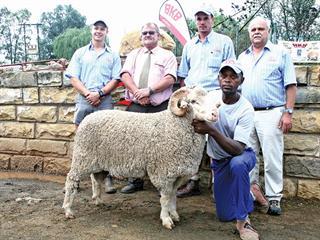The tyranny of the trophy record and award hunting programmes are at odds with the ethics of nature conservation, and destroy the hunter’s experience of appreciating and participating in the natural world.
But can professional hunters preserve their ethics, when all their clients are interested in are
record trophies, and when they’ll encourage – even insist –
on unethical hunting practices to get them?
Stewart Dorrington and Peter Butland of the Professional Hunters’ Association of SA (PHASA) contend that the measuring tape brings out the worst in hunters, turning ethics into a professional liability.
Internationally, there’s concern that record-and- award programmes are compromising much of what hunting is about. An individualistic pastime is being turned into a fierce competition in which fair chase, traditions and sound conservation fall by the wayside. That’s why professional hunters must show visiting clients that the fulfilment in hunting isn’t found in inches and points, but in a holistic, participatory experience in natural surroundings. Anything else lessens the value of the experience. There are many dedicated professional hunters who conduct their safaris with integrity and refuse unacceptable demands, turning their backs on the money.
They look for different ways to evaluate trophies, achieve desired ends and avoid undesirable results. Unfortunately, too many visiting hunters want to hunt a long shopping list of trophy animals in limited time. Many want record trophies – in the top 10. These unrealistic expectations put professional hunters under extreme pressure, putting their reputations at stake. Besides, a trophy obtained easily isn’t well-remembered, or cherished. What do professionals do when clients demand record trophies and insist on unfair chase methods to achieve their goals? If they disregard the client’s wishes, they risk a poor report. International hunting associations accord enormous market power to the record books, exacerbating the dilemma for both outfitters and professional hunters. While both associations and individuals criticise current recording and award procedures, the matter hasn’t been addressed on an internationally coordinated basis. Associations must look for a solution that considers everybody’s interests, including biodiversity conservation.
For sustainable trophy hunting, game populations must be managed according to biological principles, not the figures of a scoring system. Killing a high-scoring, yet immature animal compromises sustainability. What is ethical hunting practice in one culture may be unethical elsewhere, but remember that hunting ethics are the product of millennia of hunting traditions. They evolve with time, but hinge on one key factor – sustainability. The challenge for all hunters is to decide what’s right and what’s wrong and to stand by their value systems. It’s not for the professional hunter to judge the motivations of his clients, who are products of their upbringing and cultures. Were it not for them, with all their good and bad points, there would be no hunting profession. It’s the professional hunter’s job to meet the client’s reasonable expectations. Professionals must empathise with clients and try to understand their backgrounds. They must try to open clients’ eyes to the beauties of the natural world, sharing their knowledge and understanding with them. But, professionals must guide clients in the hunt in accordance with their own value systems. This is where the professional hunter’s dilemma begins. On what principles should they base their value system?
A genuine, informed and applied concern for wildlife’s well-being is a good starting point, and will eventually affect wildlife, the environment, and the clients’ respect for the professionals and their profession. But do professional hunters have the luxury of time? sound ethical code is essential, but does the professional have the strength of character to impose it on strong-willed clients with their own, perhaps very different, hunting ethics and ambitions? Most professional hunters already know which ethics should form the basis of their value systems, but the pressures of the modern world intrude. Their values in the hunting field can and do corrupt. Competition and the desire to see their names in the record book tempt professional hunters, too. Great strides have been made in nature conservation in southern Africa in recent decades. Applied scientific, social and economic principles have benefited wildlife and the environment. Increasing wildlife numbers have been widely, though not universally, matched by improved trophy quality. Success in habitat restoration, the rebirth of biodiversity in previously devastated areas and the reintroduction and conservation of wildlife should be honoured and respected by every professional hunter. Ultimately, it is that respect which should underpin hunters’ value system. – Roelof Bezuidenhout Contact PHASA on (012) 667 2048, e-mail [email protected] or visit www.professionalhunters.co.za. |fw









